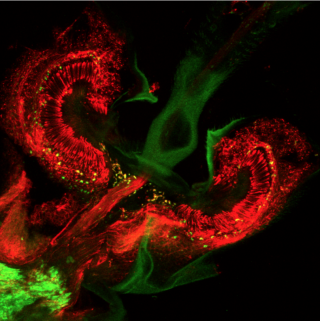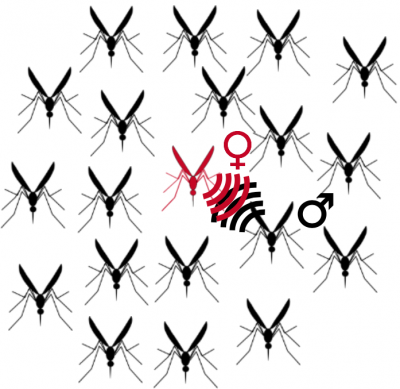- Efferent neuromodulation of the mosquito ear
- The mosquito auditory organ, the so called Johnston’s organ, is a highly complex sensory organ located in the antenna. We have recently discovered that it is innervated by an efferent system, namely that the brain directly controls its function, a highly remarkable feature as mosquitoes are the only insect where auditory efferents have been found. In vertebrates, auditory efferents are believed to provide protection from acoustic trauma and to facilitate the discrimination of sound. In mosquitoes, efferent fibres release the neurotransmitters octopamine, serotonin and GABA that modulate the auditory function.

In the lab, we are investigating how the neurotransmitters released by the efferent innervation influence different aspects of the auditory physiology and how this modulation affects how mosquitoes communicate to each other. We use a genetic approach to generate mutant and reporter lines of the efferent neurotransmitter receptors. We also perform auditory and behavioural tests to disentangle the action of the efferent input. Our findings will contribute to an improved understanding of the mosquito acoustic communication and, due to the importance of mosquito audition to mosquito reproduction, suggest new targets for vector control.Collaborators: Joerg Albert (University College London)
- Biogenic amine modulation of malaria mosquito swarming behaviour
- Serotonin and octopamine are biogenic amines released by the efferent innervation into the mosquito ear. In mosquitoes, hearing and swarming behaviour are intimately related as acoustic interactions leading to mating take place within swarms for most medically relevant mosquito species. Despite the importance of swarming behaviour for mosquito reproduction, almost nothing is known about how mosquito swarming behaviour is endogenously regulated. As octopamine and serotonin modulate swarming behaviour in other insect species, we hypothesized that this could also be the case in mosquitoes. In the lab, we are developing assays to analyse the mosquito swarming behaviour and study if the biogenic amines mutants show defects in their swarming behaviour. We are also performing field studies to understand the potential of interfering with the serotonergic and octopaminergic signalling to disrupt mosquito swarming behaviour.

Collaborators: Infravec2, Roberta Spaccapelo (University of Perugia), Sarah Moore (Ifakara Health Institute) - The auditory system as target of novel insecticides
The neurotransmitters released by the auditory efferent system signal mostly through G-protein coupled receptors (GPCRs). GPCRs are considered promising targets for developing next generation insecticides. We hypothesized that interfering with the efferent input would lead to an impaired mosquito acoustic communication and therefore to an impaired mosquito reproduction. In the lab, we are firstly developing a proof-of-concept to demonstrate the potential and feasibility of disrupting the efferent signalling to impair mosquito reproduction. We are also studying the effects of currently available commercial insecticides that target the efferent neurotransmitter receptors. We will then aim at translating our findings to use novel pharmacological approaches to disrupt the auditory efferent activity and exploit its potential for vector control.
Collaborator: Sarah Moore (Ifakara Health Institute)
 Close
Close

